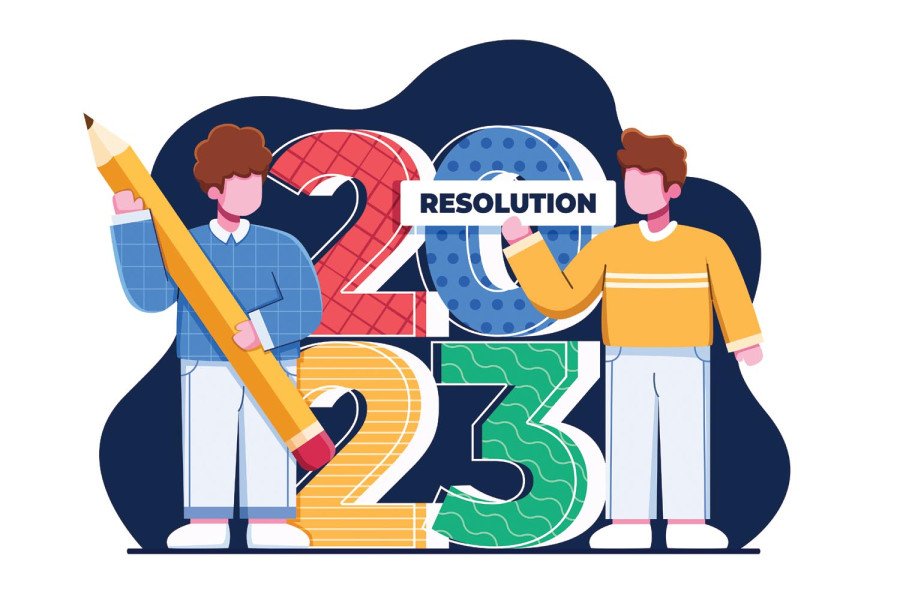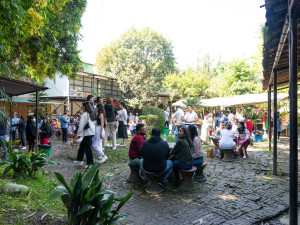 16.12°C Kathmandu
16.12°C KathmanduCulture & Lifestyle
Why are New Year’s resolutions easy to make but difficult to follow through?
Just because we are changing our calendars does not mean we can change ourselves at the same drastic rate.
Sujina Manandhar
In the final days of 2022, most of us reflected on the good and bad bits of the year. While reminiscing our accomplishments brought joy, most of us likely felt disappointed in our progress. And we most likely thought to ourselves, “My upcoming year will be much better than the last one. I will give up on my bad habits and become much more productive.”
Chances are, many of us might have made a list that we all know as ‘The New Year’s resolution’ and filled it up with all the things we wanted to but couldn’t achieve the past year, along with some newer expectations and goals for ourselves. We then promised ourselves that by the end of 2023, we would achieve everything on the list and perhaps much more.
But as the days pass by and this ‘new’ year starts to age, it becomes just another year, with each day uncovering more and more of those old habits that we had carefully tucked away and promised ourselves not to ever fall into again. We make small excuses for not following the resolution and tell ourselves, “Let today be an exception; I will do it tomorrow”. Bit by bit, the actual list of things we stick to gets shorter and shorter. A few of us even forget the list altogether. And with every failed attempt, we become increasingly frustrated and annoyed with ourselves.
Let’s be honest; just three days into this new year, some of us might already be struggling to keep up with the newly formed resolutions and have already fallen back into old patterns of habit even if, logically, we all know what we ought to be doing. So why can’t we follow through with our resolutions? The answer is simple: Habit. The New Year’s resolution list only gives us a general idea of what we should and should not do. But knowing what to do and actually doing it are two very different things. That’s where habit plays its role.
If we pay close attention, most of the activities we do each day result from our habits. Through constant and multiple repetitions, we have established some very strong habits that may not be acting in our favour. Logically we know we should not be doing them. We are also determined not to. But yet, because of its deep-rooted nature, we almost automatically keep repeating them.
While trying to give up on an old habit, we must understand and accept something simple: Just because we are changing our calendars does not mean we can change ourselves at the same drastic rate. Many of our habits have been engraved in us for years, even decades. Uprooting them will always be a challenging task. So, we must first stop bombarding ourselves with extreme expectations that we will suddenly wake up tomorrow and have the motivation, energy, and discipline actually to follow through. This may cause us to be discouraged and give up. Instead, embrace the process of change.
Setting simple, clear, and attainable goals will help you in this process. Giving up smoking can be realistically changed into reducing the number of cigarettes you smoke per day. Not using social media completely can be made attainable by reducing the time spent on it. Whatever goal you set, make sure you keep yourself accountable.
While trying to do something new or form a new habit, it takes our brain extra effort to start because there are no mental pathways in our brain for reference. Habits are like paths in a jungle. Initially, there won’t be any paths. So it won’t be easy to start walking and find a way. All our actions and behaviours leave paths as we walk on them, and they become more pronounced and easier to walk on the more we use them. Try using the techniques that have worked for you in the past. For example, if you have a goal of losing weight and a certain type of diet has worked for you in the past, try sticking to the same or similar diets rather than opting for some trending or a fancy new technique that would be difficult to get used to.
A simple act of specifying when, where, and how you will do something and what you want to do will greatly increase your chance of actually doing it rather than just planning. This simple technique has been found to be scientifically beneficial in beating procrastination. Try scheduling specified activities for a specific time each day for even better outcomes.
It will be much easier to habitually do something at a set time than at random times each day. The time will serve as a cue to motivate you to take action, making it simpler to start.
Once we achieve the goal, rewards will encourage us to maintain our consistency. Rewards can be big or small; they need to be something enjoyable that makes you feel good. The human mind thrives on rewards. If we get a reward immediately after attaining our goals, it will greatly increase the chance that we will repeat that behaviour time and again. The more enjoyable and immediate a reward, the more likely we will be to perform an action that led us to that reward.







.jpg&w=200&height=120)












